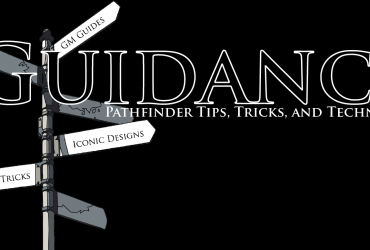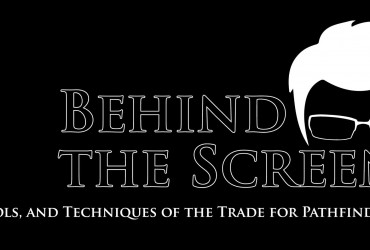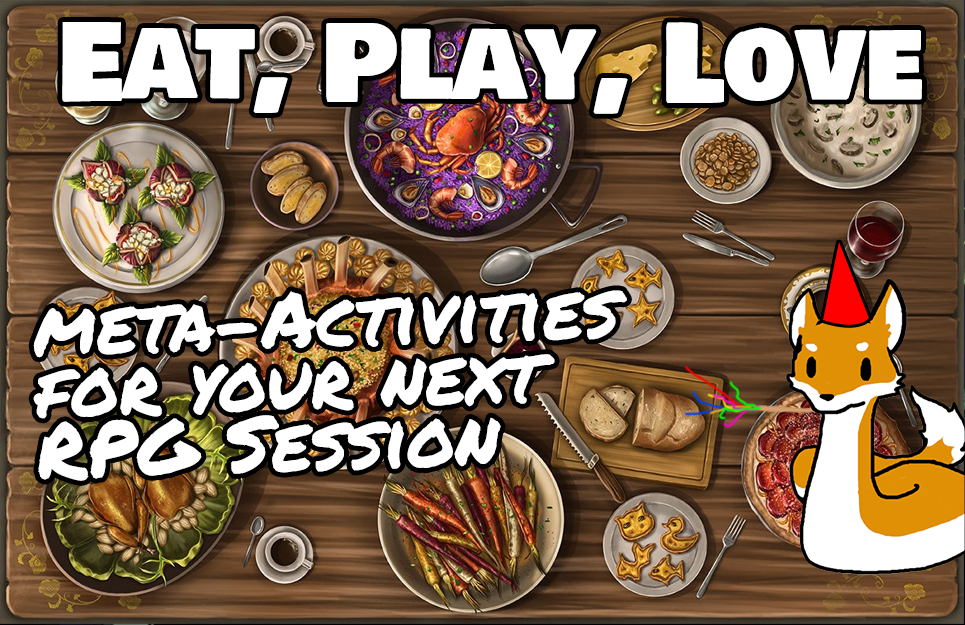During the Read Magic segment of Know Direction 130, Perram, Alex, and I reviewed Paizo’s new hardcover for the RPG line, Ultimate Intrigue. I took umbrage with a sidebar in the Verbal Duel section of Chapter 4: Social Combat.
Optional Rule: Inspired Roleplaying
While not everyone is as good at verbal sparring as their character’s statistics indicate, players will often want to roleplay their tactics during a verbal duel. For particularly inspired or heart-felt roleplaying, the GM might award up to a +2 modifier on a tactic’s associated skill check. For brilliant roleplaying during a verbal duel, a GM might award an edge, and that edge can be general or keyed to a particular tactic.
-Ultimate Intrigue pg 178
It gave me flashbacks to 2nd edition Dungeons & Dragons, the system that taught me both the game and the meaning of the word “dump stat”. Perram and Alex took umbrage to my umbrage, and so we took a moment to air our grievances and move on. But I felt a lot of my issues were lost to vocabulary, because…
What is “Good” Roleplaying?
Credit to the sidebar, it does not use “good” as the adjective that historically this advice has used, but “inspired” and “heart-felt” instead. I say historically, because this advice is not new to RPGs, or even new to Pathfinder (although I was surprised I couldn’t find the same idea, phrased as advice, in the Game Mastery Guide). The argument is that good roleplaying should trump a bad statistic or role, and reward the roleplaying. I have two issues with this:
- It’s the wrong word;
- And the wrong reward.
The Wrong Word
What I’ve seen people define as “good roleplaying” is actually “highly engaged bad roleplaying”. Or, put more politely, “engagement”. Roleplaying should be self-explanatory, it is the act of taking on a role. If you’re playing a prototypical barbarian, you shouldn’t be crude and vulgar when it doesn’t matter but a silver-tongued genius when that’s the solution to the problem in front of you.
Look at it this way: Dustin Hoffman. He’s objectively an amazing actor, having won two Best Actor in a Leading Role Academy Awards, one of which was for Rain Man. Imagine you have a player in your party with the acting skills of Dustin Hoffman playing a character like Rain Man. His character choices fascinate the other players, but they also challenge the character in certain situations. That is unless he’s suddenly Ted Kramer giving the courtroom speech that won Hoffman his other Best Actor in a Leading Role Academy Award, for Kramer vs Kramer whenever a Charisma check is called for. That’s two Dustin Hoffman award winning performances, how can that be anything but good roleplaying? Because it’s conveniently dismissing everything established about the character to facilitate overcoming a challenge. It’s Krusty the Klown as President Roosevelt dramatically walking across the stage without the “oh, that’s right! I’m crippled!”
Just because it’s bad roleplaying doesn’t mean it’s bad for the group, of course. Engagement is actually the ultimate goal of any GM. So what’s the problem?
The Wrong Reward
My very first RPG character was a 2nd edition fighter named Scramble. It is also the first time I found out “because he’s charismatic,” is not an acceptable answer for some to the question “why did you give your fighter high Charisma?” This is also when I learned that different people play this game in different ways and for different reasons.
There weren’t many mechanical reasons to put anything but your worst stat into Charisma in 2nd edition, but 3rd edition fixed that with a variety of Charisma-based skills. Pathfinder fixed it further by removing the high cost of cross-class skill investment. Now everyone has a reason to care about Charisma, and everyone can mitigate a low Charisma with an investment of skill points. Granting a +2 bonus to Charisma-based skills for highly engaged bad roleplaying incentivizes them for ignoring or neglecting Charisma-based skills. It’s min-maxing and metagaming combined under a false roleplaying flag.
All things being equal in Pathfinder, getting a bonus without committing aspects of your build to it creates more powerful characters. The moderate roll or points buy points that could have been spent on Charisma can be spent on one of the good ability scores. Skill points that could have been invested in Bluff, Diplomacy, or Intimidate are put in a useful skill. Because who needs to spend character resources on Charisma-based options when you get rewarded for breaking character?
The Right Word, The Right Reward
A GM does not want an engaged player, they want an engaged group. And just like the fighter getting overshadowed in combat by an animal companion can disengage the fighter’s player, the character built for combat getting to pretend it’s also built for Charisma can disengage the players who actually spend character resources building up their Charisma, as well as the players who treat their ability scores as a system that rates or “scores” their character’s abilities instead of numbers that only mostly apply. How should a GM reward engagement? With engagement.
Barbara the Barbarian: I say to the bribed palace guard “What would your parents think, knowing all their sacrifices to get you into this prestigious position have been wasted on such a disreputable child. You betray yourself and your lineage.”
GM: That’s great Barb, oh, except you rolled a 10, and with your Charisma modifier, that’s an 8 total, so it comes off like “You bad, make dad mad.” For a second it seems to affect him, but then he just squints at you sideways. Luckily, you’ve been adventuring with Barry long enough that he gets the gist of what you’re saying. Barry, if you want to try translating Barb’s speech…
Barry the Bard rolls an 18.
GM: Nice! So Barry basically says what you just said, Barb, only speaking is what he does. So together, your words through his mouth bring the guard to tears and he throws the coin pouch bride into the moat and leaves his post.
Barbara the Barbarian: I dive in after it!
GM: Sure. You may not have ranks in Diplomacy, but you certainly have ranks in Swim.
A GM that rewards play with numbers gets a table that thinks the game is all about numbers. Awarding a player numerically for being more charismatic than their character isn’t exactly like awarding players a bonus to Dexterity-based skills for doing backflips at the table, but the better comparisons are worse visuals. A GM that emphasizes engagement and roleplaying gets a table that’s engaged back.
Do whatever works at your table, obviously, but remember that a solution for one player might be an issue for another player. Maybe bards wouldn’t have a reputation for being useless if fewer players treated their specialty like an option available to every character for free.
Ryan Costello is the host of the Know Direction podcast and founder of the Know Direction podcast network. He takes words very seriously.








Couldn’t agree with you more Ryan. One of the many reason I find a session 0 and character backgrounds so helpful. The players and the GM can really work out character personalities and individual/team motivations before the dice begin to roll. I fend the hero point a great reward for great role playing that aligns with those traits and motivations.
I agree with you to a point. I once argued with my DM who would not take my characters high charisma into account when making a diplomacy effort, making me debate in real life, and I argued that I did not have a real-life strength, either, but my character was still allowed to swing a sword without penalty. I think he was looking to inspire more interaction or role-play, but ended up devaluing the mental attributes (we had to solve our own puzzles and riddles as well, and were not allowed to use spells to help).
Nowadays, I would probably give a +2 circumstance bonus for making a good argument, showing that the argument is at least valid (and, as Perram stated, to encourage participation). The examples you listed of role playing low stats/skills, I think I would prefer to reward in a different way, with a free reroll later in the night, an xp bonus (that the whole group gets), or possibly as an early level (when the character is within 10% of xp to level).
By the way, I thought it was fortuitous that I had just listened to an older Private Sanctuary (155 Diplomacy Debate with Jay) and it made a very good companion piece regarding this subject, and I highly recommend anyone interested to hunt it down.
Yep, how to run Charisma-based encounters is a long running topic on the site, and I’ve felt like I’m in the minority for most of it. I am not arguing that everyone has to run it my way, I just wish they wouldn’t say things like “I do it for the roleplaying” or “it’s all in the name of fun.”